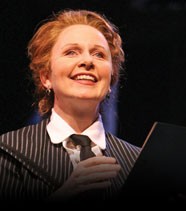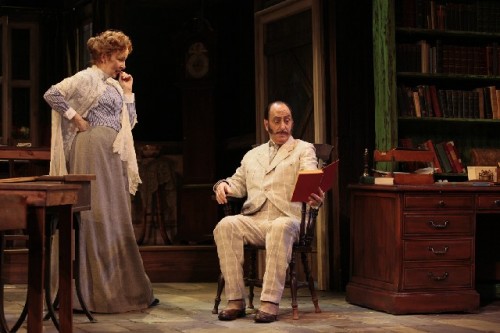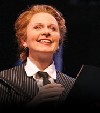Charming The Corn Is Green at Huntington
Kate Burton Shines in Spirited Portrayal
By: Mark Favermann - Jan 15, 2009
The Corn Is GreenThe Huntington Theatre Company's The Corn Is Green is theatre at its most appealing. It is a theatrical delight. Actress Kate Burton does a star turn with grace, elegance and stature. There are very few disharmonious notes in this wonderfully symphonic presentation of actors, playwriting and directing.
The story by Emlyn Williams is a now classic play about an inspirational, quirky teacher, Miss Moffat, and a student who she grooms for a scholarship to Oxford University. Burton plays the teacher while her son Morgan Richie plays the student Morgan Evans. The tough, take no prisoners, spinster Miss Moffat literally transforms the raw, unschooled Evans into an intellectually thirsty scholar from a just hungry coal boy in a poor Welsh mining village.
The Corn Is Green is an old fashion yarn of the underdog rising to a challenge with underpinnings of class warfare as well as nationalistic and ethnic prejudice. But, this states a much more severe case than the actual narrative and characterizations portray. There is an optimistic good humor to it all.
Emlyn Williams based the play on his own personal experience, a relationship with a transformative school teacher that he encountered in his rural Welsh home village. Williams portrayed Evans himself in the production's London premiere in 1938. He also directed it. The play had long runs in London's West End and on Broadway. The 1941 Bette Davis film version is a gem.
Kate Burton's father Richard Burton (that makes her Elizabeth Taylor's stepdaughter) played Morgan Evans in a 1947 BBC production of the play. Emlyn Williams and Richard Burton remained close friends throughout their lives. Richard Burton named Williams Kate Burton's godfather when she was born. Added to this family resonance is the fact that her son Morgan Richie plays the same role that his grandfather played over sixty years ago.
Various versions of the play have had prominent actresses play Miss Moffat. Starting with Ethel Barrymore, Bette Davis and Katharine Hepburn, Kate Burton follows in a distinguished line of prominent actresses. Earlier, she and Morgan performed their current roles in 2007 at The Williamstown Theatre Festival. Nicholas Martin directed that production as well.
The pacing and dialogue are appealing. The play's narrative flows. The whole story has a charm and a spirit that are reinforced particularly by Kate Burton's portrayal of idealistic but tough as nails Miss Moffat, Will LeBow's spot-on Squire, Kristine Nielsen's light-fingered but converted Cockney Mrs. Watty and Mary Faber's conniving but coquettish Bessie Watty.
The Welsh music sprinkled through the play is a delightful character itself. The play begins with the fabulous Welsh lullaby Suo Gan. The Welsh are known for their singing and beautiful melodies. In this version of The Corn Is Green, Welsh music is a counterpoint to the hard life of the impoverished, unlettered miners' families.
There are a few weaknesses in the production. They include the various accents--Welsh, British upper class, Cockney and Scottish that seemed to not be quite in synch, the set was too bright and cheery to embrace the darker sides and harder edges of the story and Morgan Richie as Morgan Evans and his poor coal mining pals were all a bit too well-fed and not quite gritty enough to appear realistic. But the charm and pacing of the story somehow get over these other issues.
The Corn Is Green is a play of hope and a play of redemption. It is also ultimately a play about love. What better time to see a play about hope and redemption than now in our economic winter of discontent? The Huntington has another hit: The Corn Is Green is a theatrical treat to be savored.




